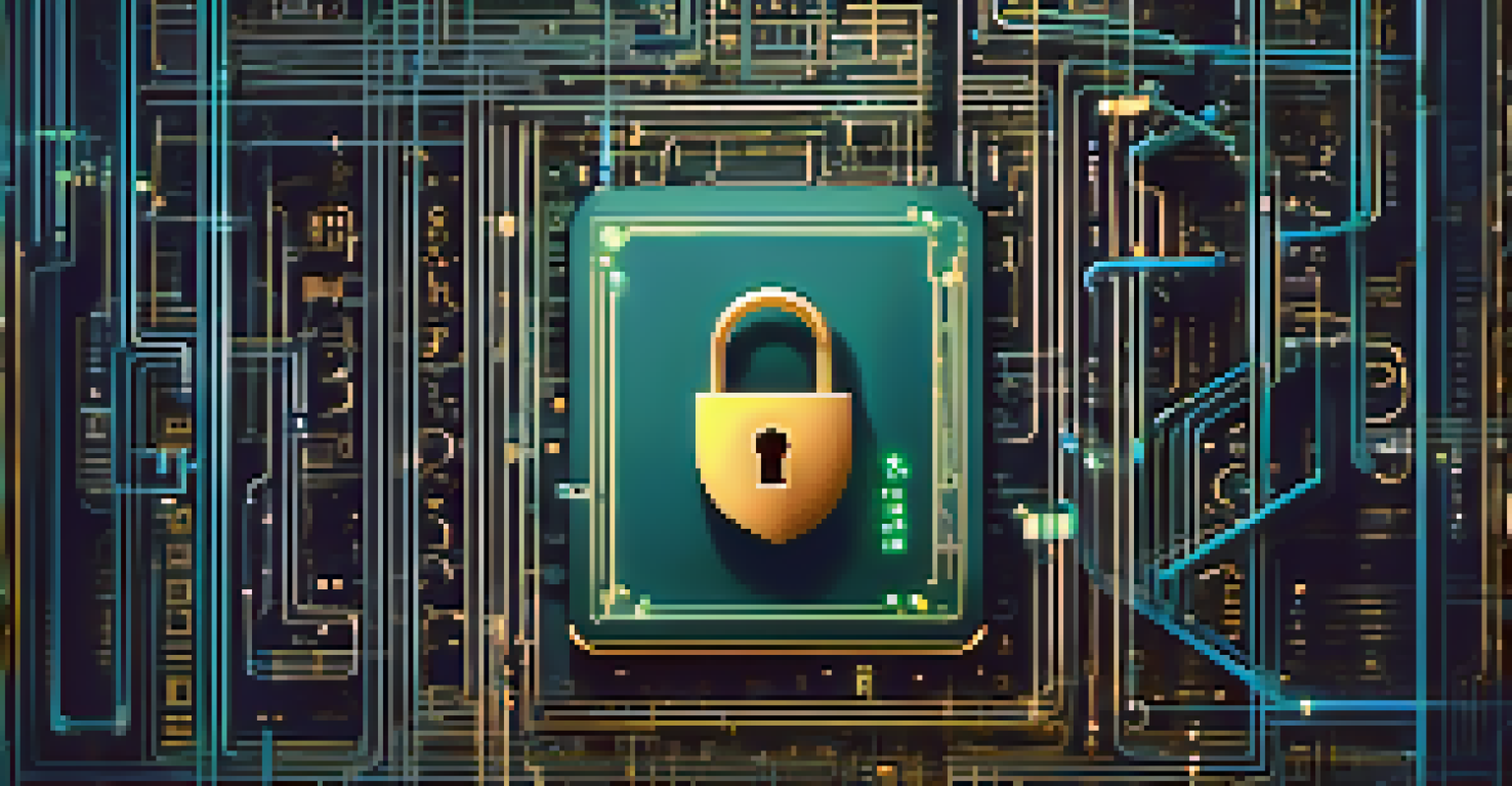NFTs and Data Privacy: Understanding Your Rights

What Are NFTs and Why They Matter in Data Privacy
NFTs, or non-fungible tokens, are unique digital assets verified using blockchain technology. Unlike cryptocurrencies, which are interchangeable, each NFT is one-of-a-kind, making them ideal for art, music, and other creative works. This uniqueness raises important questions about data privacy, especially as ownership and transaction details are often publicly accessible on the blockchain.
Data privacy is not just about keeping information private; it's about creating trust and confidence in digital interactions.
When you buy or sell an NFT, your personal information can sometimes be linked to that transaction, leading to potential privacy concerns. This connection highlights the need for creators and collectors alike to understand how their data is being used and shared. As the NFT market grows, so does the importance of protecting your personal data in these transactions.
Understanding the intersection of NFTs and data privacy is crucial for anyone involved in the digital space. It's not just about ownership; it's about safeguarding your identity and personal information in a landscape that can often feel overwhelming and unregulated.
Data Privacy Laws: What You Should Know
In many countries, data privacy laws, such as the GDPR in Europe and the CCPA in California, govern how personal information is collected, used, and stored. These laws are designed to protect individuals' privacy rights and grant them control over their data. When it comes to NFTs, these laws can have significant implications for both creators and collectors.

For instance, under GDPR, individuals have the right to access their personal data, request its deletion, and know how it's being processed. This means that if you engage in NFT transactions, you should be aware of your rights regarding any personal information that might be collected during the process. Understanding these laws empowers you to take control of your data.
NFTs and Data Privacy Concerns
NFT transactions can expose personal information, highlighting the need for awareness around data privacy.
Navigating data privacy laws can be complex, especially in the fast-evolving world of NFTs. However, being informed about your rights is the first step toward protecting your data and ensuring that your NFT transactions are secure.
Privacy Risks Associated with NFTs
While NFTs offer exciting opportunities for artists and collectors, they also come with privacy risks that cannot be overlooked. One major concern is the potential for data breaches, where sensitive information linked to NFT transactions could be exposed. This exposure can lead to identity theft or unauthorized use of your personal data.
In the digital age, data privacy is a fundamental human right that must be prioritized by all.
Additionally, the public nature of blockchain technology means that transaction details, including wallet addresses, can be traced back to individuals. This transparency can be a double-edged sword; while it fosters trust in the system, it can also compromise your anonymity. Thus, understanding how to mitigate these risks is essential for anyone engaging with NFTs.
Being aware of these privacy risks allows you to take proactive measures to protect your data. Whether through using privacy-focused wallets or participating in platforms that prioritize user confidentiality, you can navigate the NFT space more safely.
How to Protect Your Data in NFT Transactions
Protecting your data in NFT transactions involves several practical steps that you can easily implement. First, consider using a separate wallet dedicated solely to your NFT activities. This separation can help limit the exposure of your primary wallet and personal information in case of a breach.
Next, always research the platforms where you buy and sell NFTs. Opt for marketplaces that prioritize user privacy and security, and read their privacy policies thoroughly. Knowing how your data will be handled can give you peace of mind and help you make informed choices.
Understanding Data Privacy Laws
Familiarity with data privacy laws like GDPR and CCPA is essential for NFT creators and collectors to protect their rights.
Lastly, consider using pseudonyms or anonymous profiles when engaging in NFT transactions. By minimizing the personal information you share, you can further protect your identity while enjoying the benefits of the NFT market.
The Role of Smart Contracts in Data Privacy
Smart contracts are self-executing contracts with the terms of the agreement directly written into code. In the context of NFTs, they automate processes like transfers of ownership and royalty payments. However, they also play a crucial role in data privacy by controlling how and when personal information is shared.
By utilizing smart contracts, creators and collectors can set specific conditions for data sharing, ensuring that personal information is only accessed with explicit consent. This level of control can empower users to make decisions about their data during NFT transactions.
Understanding smart contracts and their implications for data privacy can help users navigate the NFT landscape more securely. As technology evolves, so too will the capabilities of smart contracts, potentially enhancing privacy protections in the NFT space.
NFT Marketplaces and Their Privacy Policies
Not all NFT marketplaces are created equal when it comes to data privacy. Each platform has its own privacy policy that outlines how they handle your data. Some may require extensive personal information, while others may prioritize anonymity. Understanding these policies is vital before engaging with a marketplace.
When choosing a marketplace, look for clear and transparent privacy practices. Are they compliant with data privacy laws? Do they offer options to limit the information you share? These questions can help you find a platform that aligns with your privacy needs.
Protecting Data in NFT Transactions
Implementing practices like using separate wallets and researching marketplaces can enhance data privacy during NFT activities.
Taking the time to research and compare different NFT marketplaces can significantly enhance your data privacy. The right choice can provide not just a better user experience but also greater peace of mind regarding your personal information.
Future Trends: NFTs and Data Privacy Evolution
As NFTs continue to gain traction, the discussion around data privacy will inevitably evolve. Emerging technologies, like zero-knowledge proofs, may enhance privacy by allowing transactions to be verified without revealing the underlying data. This could address some of the current concerns about the public nature of blockchain.
Moreover, as regulatory frameworks around data privacy strengthen, NFT platforms may adapt by implementing more robust privacy measures. This shift could lead to a safer environment for users, encouraging more people to participate in the NFT market without fear of data exposure.

Being aware of these trends can help you stay ahead in the NFT space and make informed choices about your data privacy. The future of NFTs is not just about ownership and creativity; it's also about ensuring that your personal information is safeguarded.